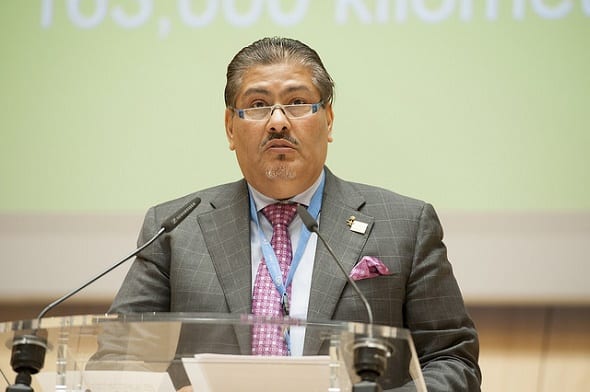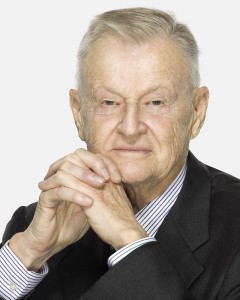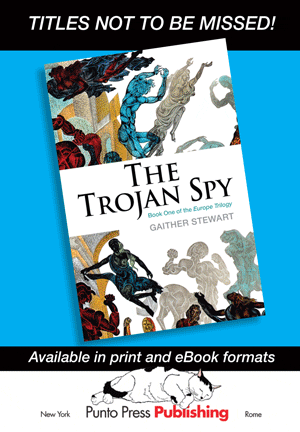Avoiding the Failure of Libya: US Strategy in Syria
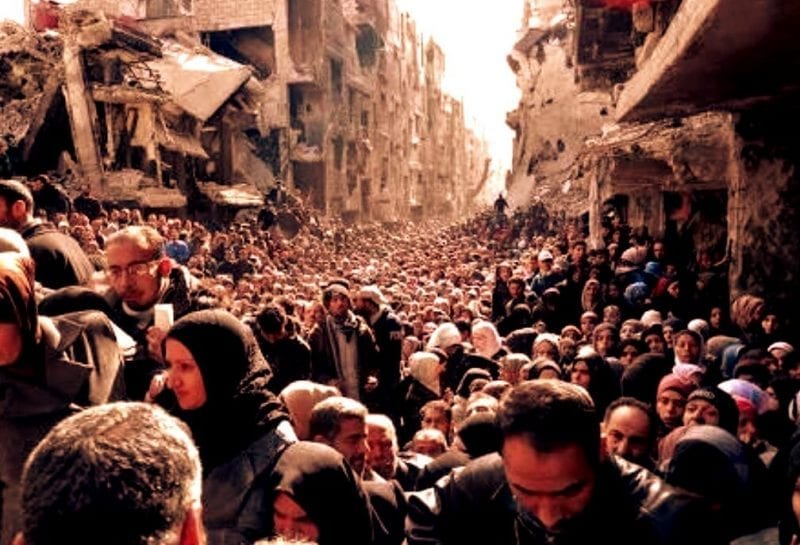
Literally rivers of Syrians stream out of a nation brutally broken up by the imperialist assault. The scenes are simply Dantesque, while in Washington people dance and champagne flows as usual. (Click on image.)
While Washington toppled a resource nationalist in Libya who annoyed US oil companies, it failed to install a successor government in a stable environment in which US interests could be effectively advanced. US policy in Syria emphasizes “an orderly political transition” in which Arab nationalists vacate the Syrian state, yielding to anti-nationalist US marionettes. The political transition is to be brought about by proxies, militant jihadists, who the United States and its allies will strengthen enough to weaken and dispirit the current government in Damascus but not enough to topple it and plunge the country into a Libya-style chaos.
Washington’s strategy in Syria is an implicit admission that its direct military interventions in Afghanistan, Iraq and Libya have failed to bring about its desired foreign policy objectives of establishing stable conditions in which pro-US regimes can carry out policies to advance Wall Street’s economic, and Washington’s interlinked political and military agendas, in those few remaining parts of the world that refuse to submit to US hegemony, alternatively described as the international dictatorship of US business interests .
To be sure, the objectives have been partially met. There’s a US-installed regime in Kabul, but the active resistance of the Taliban limits its room to maneuver to advance US goals. Sectarian strife in Iraq, largely the consequence of the divide and rule policies forced upon Iraqis by US occupying forces in the mid-2000s, has produced tension among Iraq’s major ethno-sectarian communities, while Iran competes with Washington for influence in the country. And the US-led (from behind) military operation in Libya—essentially a marriage of NATO air power with al-Qaeda foot soldiers to topple a “resource nationalist” whom US oil companies could no longer abide—has produced a failed state, utter chaos, and no reliable US puppet to take control of the country to reshape it in the interests of corporate USA.

Syrian army soldiers hail the recent victory in Qusayr. Assad still enjoys wide popularity in many sectors of the population, and most Syrians are aware of what awaits them at the hands of NATO proconsuls.
With these failures in mind, Washington has approached the project of purging Damascus of its governing Arab nationalist ideology more judiciously and with greater caution than it approached similar regime change projects in Afghanistan, Iraq and Libya. The strategy is to force a political settlement in which the Syrian president Bashar al-Assad and his Arab nationalist colleagues step aside, leaving the infrastructure of the Syrian state in place, to be taken over by reliable anti-nationalist US marionettes. The political settlement is to be brought about by forcing a military stalemate between the Syrian government and Islamist rebels. At some point, it’s hoped, the Arab nationalists in Damascus will realize that their situation is hopeless, and sue for a graceful exit.
The key to the strategy is ISIS and other groups of fanatical Islamist militants. They must be allowed to be strong enough to maintain unrelenting military pressure on Damascus but not so strong that they topple the Syrian government. To achieve this delicate balance, ISIS is held in check by a US-led air campaign of containment, while other jihadists are managed through controls on the amount of arms, money and training they receive from their sponsors, the United States, Britain, France, Turkey, and the Gulf oil dictatorships.
The nature of the US strategy has long been discussed openly in major US newspapers. The Wall Street Journal, The New York Times, and The Washington Post have revealed that: “The White House has drawn up elaborate plans for a post-Assad Syria that includes an orderly political transition that keeps the country together and preserves Western interests.” “U.S. officials are hoping for a diplomatic solution to keep national institutions in place.” “The U.S. … wants to keep technocratic elements of the state in place, seeking to avoid a repeat of what happened in Iraq after the 2003 U.S. invasion”. “American policy is not to oust Mr. Assad precipitously, risking an extremist takeover, but to push him to a political settlement.” The United States doesn’t want “wholesale regime change, institution collapse, state collapse (as it) saw in Iraq.” Christine Wormuth, US undersecretary of defense for policy, points to “a political transition that would see Mr. Assad step down while preserving a government structure to avoid chaos.”
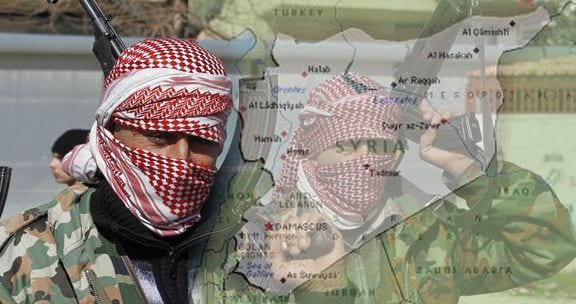
Having your cake and eating it, too. Washington created the latest brand of Jihadists, yet now it claims to be fighting them in the name of human rights and other hypocrisies.
Major U.S. newspapers have also revealed that “The (US) end game requires a very careful calibration that doesn’t tip the meter in an unintended way toward groups that could produce the kind of post-Assad Syria that (the United States isn’t) looking for.” Underscoring this point “The Obama administration doesn’t want to tip the balance in favor of the opposition for fear the outcome may be even worse for U.S. interests”. “The White House wants to strengthen the opposition but doesn’t want it to prevail.”
Significantly, “The CIA’s mission…has been defined by the White House’s desire to seek a political settlement, a scenario that relies on an eventual stalemate among the warring factions rather than a clear victor. As a result…limits on the agency’s authorities enable it to provide enough support to help ensure that … U.S.-supported militias don’t lose but not enough for them to win.” “Gen. Martin Dempsey, (when he was) chairman of the Joint Chiefs of Staff, (was) particularly outspoken with lawmakers about his concerns that weakening Mr. Assad too much could tip the scales in favor of al Qaeda-linked fighters.”
[dropcap]W[/dropcap]ashington’s policy of forcing competing forces in Syria to bleed each other into exhaustion is looked upon favorably by the Israelis, who see it as coming straight out of the playbook of setting Arabs against each other, leaving the Zionists free to continue their project of usurping Arab territory as the Arabs descend into a hell of intra-ethnic internecine warfare. This is congenial to the Zionists’ “imperialism by the inch” as novelist Susan Abulhawa terms it. “Israeli officials have told their American counterparts they would be happy to see its enemies Iran, the Lebanese Shiite militia Hezbollah and al Qaeda militants fight until they are weakened.” Meanwhile, Alon Pinkas, a former Israeli consul general in New York, notes that “This is a playoff situation in which you need both teams to lose, but at least you don’t want one to win — we’ll settle for a tie. Let them both bleed, hemorrhage to death: that’s the strategic thinking here. As long as this lingers, there’s no real threat from Syria.”

A pro-Assad demonstration. If many Syrians did not stand behind him, the regime would have fallen a long time ago.
It seems clear now that US planning for a post-Assad Syria foresees an end to aid to its jihadist allies—the United States “has trained and equipped nearly 10,000 fighters sent into Syria over the past several years” through a covert CIA program—and an intensification of the US campaign against ISIS, if, and when, a political settlement is reached to purge the Syrian state of its Arab nationalist elements. Obama’s choice of words in declaring war on the self-proclaimed caliphate was not insignificant. The US president said that the Pentagon would “degrade and ultimately destroy” ISIS. So far US and allied forces have only degraded the militant group’s capabilities, holding it in check so that it doesn’t grow strong enough to topple the Arab nationalists, while not pressing so hard that ISIS is destroyed. The Pentagon won’t turn to destroying ISIS until its usefulness in advancing the US agenda of forcing a military stalemate and Assad’s exit through a political settlement has been realized. At that point, and only then, will the hammer come down.
The character of the Pentagon’s ISIS campaign is reflected in the complaints of many people, from Assad to Obama’s critics in Washington, that the campaign has been ineffective and seemingly half-hearted. Assad points out correctly that the Syrian Arab Army has borne the brunt of the fight against ISIS, and that the Syrian air force, small by comparison with US coalition forces, flies more missions.
Veteran journalist Robert Fisk echoes Assad’s assessment. “I don’t think the U.S. is serious. Very occasionally, you can hear the rumble of American bombs. But they’re certainly not having much effect.”
According to US secretary of state John Kerry, “Our focus remains on destroying ISIL and also on a political settlement with respect to Syria.” US strategy might be more aptly summed up this way: “Our focus remains on destroying ISIL eventually and also on a political settlement with respect to Syria to be brought about, we hope, partly by the pressure ISIS and other jihadists can bring to bear on Damascus.”
According to Western dogma, Kerry, along with British foreign secretary Philip Hammond, are champions of democracy, on a moral plane far higher than that on which the Syrian president operates. After all, Assad is a dictator, or so we’re told, whose ‘brutal repression” of “largely” (i.e., not entirely) peaceful demonstrations in 2011 sparked an Islamist rebellion. It’s not clear how a peaceful call for democracy can almost instantly metamorphose into a violent rebellion on behalf of the anti-democratic project of creating a state based on the Quran. But this is not the only reason to question the narrative. The story suffers from another problem.
Islamist rebellions have been an ongoing feature of Syria’s modern history, antedating Bashar al Assad’s presidency. Tensions between secular Arab nationalists on the one hand, and conservative Islamists on the other, have been a staple of Syrian politics. The conflict has often been deliberately stoked by London and Washington, seeking to use political Islam to counter communist and nationalist threats to their domination of the Near East and its immense petroleum resources, no less in Syria than in Egypt (against Nasser), Iraq (against Saddam Hussein) and in Afghanistan (against a leftist, secular, modernizing government committed to eliminating discriminations based on race, sex and property.) Britain and the United States don’t want the populations of Western Asia owning and controling their own natural resources for use in their own interests. As Bernard Lewis put it in a 1992 article in the virtual house organ of the US State Department, Foreign Affairs, the danger to the United States of Saddam Hussein’s invasion of Kuwait was the possibility that it would lead to ”monopolistic control (by Arab nationalists) of (Arab) oil.” Damascus is perhaps the final redoubt of the kind of Arab nationalist thinking that inspired Lewis to call for a rethinking of the Middle East.
Curiously, Kerry and Hammond appear to be able to work themselves up into great fits of outrage over Assad, the “dictator”, who, contrary to the odious appellation Western officials and media have foisted upon him, is not as dictatorial as may be supposed. He was elected in a multi-candidate contest, and Syria has an elected legislature. At the same time, the two Western foreign ministers feel only the warmest regard for Saudi dictator, King Salman, the head of a family of parasites who owes his political position, privileges and immense wealth to hereditary succession and the patronage of his imperialist sponsor, the United States. The West recognizes no limits to its indulgence of the misogynistic, anti-Shia, sectarian, belligerent, democracy-abominating brutes in Riyadh, whose reciprocal indulgence of Western business interests is no less limitless. Apart from facilitating the Western oil industry’s accumulation of profits, the Saudi royal dictatorship uses oil revenues, not to develop the Arab nation as the Arab nationalists would do, but to keep the pipeline of money flowing to New York investment banks and Western weapons companies.
For their services in expanding the wealth of the West’s corporate elite, the Saudi despots get a pass. They can send Canadian-supplied light armored vehicles into Bahrain to violently repress protestors who call for a parliamentary democracy without fear the Canadian government will allow its rhetoric about promoting human rights scuttle future sales of more light armored vehicles to Riyadh. Recently asked to justify his policy of arming a repressive regime, Canada’s prime minister, Stephen Harper could only lamely reply, “They’re our allies.” This was the same lame defense invoked by US State Department spokesman Mark Toner, when asked by a journalist for his reaction to the jaw-dropping news that Saudi Arabia, which has executed more than 100 people this year, mostly by beheading, has been selected to head a key U.N. human rights panel. “I don’t have any comment, don’t have any reaction to it,” said Toner. “I mean, frankly it’s—we would welcome it. We’re close allies.”
The nature of the blatant hypocrisy that indulges a medieval tyranny while seeking to regime-change an elected president was spelled out clearly in the pages of The Washington Post by a senior US official. “The countries that cooperate with us get at least a free pass. Whereas other countries that don’t cooperate, we ream them as best we can.” We need look no further to understand why the United States and its allies are using jihadists to try to force a political settlement in Damascus that would cleanse the Syrian state of a non-cooperative Arab nationalist ideology while giving a pass to the cooperative Saudi dictatorship to behead and crucify, sequester and veil women, prevent them from driving automobiles and subordinate them to male domination, and illegally invade, bomb and blockade Yemen (amply assisted, incidentally, by Washington and London whose high state figures never tire of singing paeans to the rule of law they have no intention of being bound by themselves.)
To return to Kerry and Hammond, the alleged democrats, and Assad, the alleged anti-democrat, which of the following statements reflects the spirit of democracy, and which reflects the spirit of its opposite, rule of a people without representation from abroad, (the very arrangement that American colonists rebelled against King George III over)?
Hammond: “Assad has to go. He can’t be part of Syria’s long-term future.”
Who is Philip Hammond, a member of the British political elite, resident of a country half a world away from Syria, to say who Syrians can and can’t have as their president?
Hammond’s arrogance, as US policy on Syria, is an affront against both geography and democracy.
![]() Nauseated by the
Nauseated by the
vile corporate media?
Had enough of their lies, escapism,
omissions and relentless manipulation?
Send a donation to
The Greanville Post–or
But be sure to support YOUR media.
If you don’t, who will?





